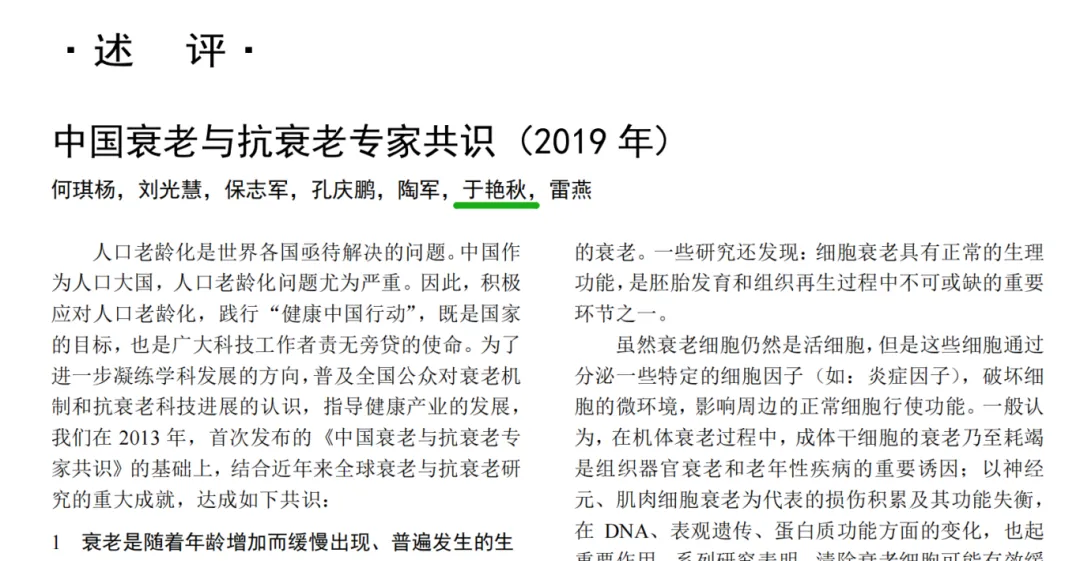Industry News
Cell therapy included in China's first “2024 Consensus of Chinese Geriatrics Clinical Experts on Research of Pharmacological Anti-Aging Interventions”
China's total elderly population and the rate of aging rank first in the world. Actively addressing the aging population has become a national focus. Therefore, delaying aging and frailty have received special attention from clinical doctors and researchers. By actively promoting aging health care technology, efforts are being made to promote healthy longevity.
In 2024, initiated by the Geriatrics Branch of the Chinese Medical Association, the first “2024 Consensus of Chinese Geriatrics Clinical Experts on Research of Pharmacological Anti-Aging Interventions” was jointly completed by domestic experts and scholars engaged in research of the field. So far, several expert consensuses or journal articles in the country have elaborated on the potential of stem cells in anti-aging research. This article will take stock of recent technical guidelines, expert consensuses, and related journal articles.
China's first “2024 Consensus of Chinese Geriatrics Clinical Experts on Research of Pharmacological Anti-Aging Interventions”
Recently, the Chinese Journal of Geriatrics published the “2024 Consensus of Chinese Geriatrics Clinical Experts on Research of Pharmacological Anti-Aging Interventions”, initiated by the Geriatrics Branch of the Chinese Medical Association and jointly completed by experts and scholars in China engaged in research on delaying aging drug intervention. Stem cell therapy is considered a scientific anti-aging strategy.
The following is stem cell therapy-related content in the 2024 Consensus:
(3) Stem Cell Therapy: Stem cells are a type of undifferentiated (embryonic stem cells) or low-differentiation state (adult stem cells) primitive cells in the body that can self-renew and differentiate into other terminally differentiated cells (functional cells such as nerve cells, islet cells, liver cells, muscle cells, etc.).
Under normal conditions, stem cells are in a dormant state. However, when stimulated by conditions such as bodily injury or aging, stem cells are activated by damage factors, differentiate into functional cells to replace damaged or aging cells, and thereby maintain a dynamic balance of tissue and organ regeneration and aging.
Research shows that the functional reserve of adult tissue stem cells decreases with age, weakening the regenerative potential of tissues and organs. Stem cell therapy is considered an effective method to supplement regenerative cells. Clinical trial results show that after injecting stem cells into elderly frail patients, some symptoms improved, and the levels of inflammatory markers decreased.
Research on treating elderly frail patients by infusing mesenchymal stem cells (MSCs) has shown beneficial effects. Transplanting bone marrow-derived MSCs in frail elderly patients has been found to improve the 6-minute walking distance, cognitive status, and physical functions of those patients.
In addition, stem cell therapy has been applied and researched in the field of treating aging-related diseases. In 2018, the MSC drug AstroStem for treating elderly dementia was approved for commercial use at the Fukuoka Trinity Clinic in Japan.
Cell-derived extracellular vesicles and mitochondria have also received increasing attention. Based on stem cells and their derivatives, technologies in delaying aging and treating aging-related diseases have shown great clinical application prospects, providing new ideas for solving clinical challenges related to aging-related diseases.
Recommendation 13: Stem cell therapy is a scientific strategy to delay aging, but research in this area is still in its early stages, and the mechanisms of action and in vivo metabolism are not yet clear. It is necessary to strengthen standardized management, conduct larger and rigorously designed translational studies, and promote the transformation of stem cells in this field.
"Chinese Expert Consensus on Aging and Anti-Aging (2019)"
In 2019, the journal Geriatrics and Health Care published the "Chinese Expert Consensus on Aging and Anti-Aging (2019)" initiated by Professor Yu Yanqiu, President of the Shenyang Cell Center. It introduced that the aging and exhaustion of adult stem cells are important causes of tissue organ aging and geriatric diseases. By infusing cells or active factors, it is possible to alleviate the harm of aging and improve the health of middle-aged and elderly people, which is a scientific anti-aging strategy.

With the development of bioengineering and biological technology, it is now possible to achieve large-scale and engineered amplification of human cells such as stem cells, immune cells, skin cells, and cartilage cells outside the body. It is also possible to extract active factors secreted by cells for the treatment of certain diseases. Transplanted cells can serve in a substitution or supplementation role, reshaping the regenerative repair capability of the human body in the aging stage.
The expert group unanimously believe that although the development of intervention strategies to delay aging and prevent aging-related diseases still faces many challenges, including regulatory difficulties, clinical trial design issues, insufficient validation of aging biomarkers, and commercial challenges in bringing new interventions to the market, still, with the aging trend accelerating, delaying aging is a hot spot in medical demand today. With the strong support of the national policy of "actively responding to aging with health and technology," it is believed that viable and effective intervention strategies to delay human aging and related diseases will emerge in the near future.